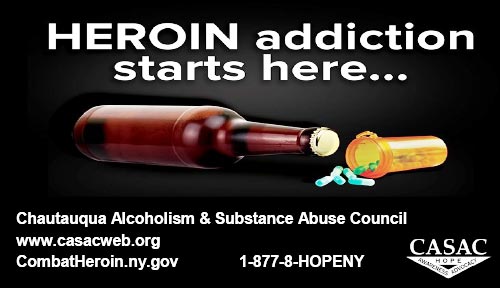Combat Heroin Campaign
A public awareness campaign educating teens, parents and the local communities about the dangers of opioid addiction and heroin use.
What are Opioids? Know the Signs and Symptoms of an Overdose
 Opioids include illicit drugs such as heroin and prescription medications used to treat pain such as morphine, codeine, methadone, oxycodone, hydrocodone, fentanyl, hydromorphone and buprenorphine. Opioids work by binding to specific receptors in the brain, spinal cord, and gastrointestinal tract. In doing so, they minimize the body’s perception of pain. However, stimulating the opioid receptors or “reward centers” in the brain can also trigger other systems of the body, such as those responsible for regulating mood, breathing and blood pressure.
Opioids include illicit drugs such as heroin and prescription medications used to treat pain such as morphine, codeine, methadone, oxycodone, hydrocodone, fentanyl, hydromorphone and buprenorphine. Opioids work by binding to specific receptors in the brain, spinal cord, and gastrointestinal tract. In doing so, they minimize the body’s perception of pain. However, stimulating the opioid receptors or “reward centers” in the brain can also trigger other systems of the body, such as those responsible for regulating mood, breathing and blood pressure.
A variety of effects can occur after a person takes opioids, ranging from pleasure to nausea and vomiting, from severe allergic reactions to overdose, in which breathing and heartbeat slow or even stop.
Opioid overdose can occur if a patient misunderstands the directions for use, accidentally takes an extra dose, or deliberately misuses a prescription opioid or an illicit drug such as heroin.
Also at risk, is the person who takes opioid medications prescribed for someone else, as is the individual who combines opioids (prescribed or illicit) with alcohol, certain other medications, and even some over-the-counter products that depress breathing, heart rate, and other function of the central nervous system.
Preventing Overdose
If you are concerned about your own use of opioids, don’t wait! Talk with the health care professional who prescribed the medication for you. If you are concerned about a family member or friend, urge him or her to talk to whoever prescribed the medication. Effective treatment of opioid use disorder can reduce the risk of overdose and help a person who is misusing or addicted to opioid medications attain a healthier life. You can also visit the Combat Heroin and Prescription Drug Abuse website at CombatHeroin.ny.gov.
For help 24 hours a day, 7 days a week, call 877-8-HOPE-NY.
If You Suspect An Overdose
An opioid overdose requires immediate medical attention. An essential first step is to get help from someone with medical expertise as soon as possible. Call 911 immediately if your or someone you know exhibits any of the symptoms listed below. All you have to say is “Someone is unresponsive and breathing.” Give a clear address and/or description of your location. The 911 Good Samaritan Law seeks to encourage people to call 911 when witnessing or experiencing an alcohol or drug overdose by providing a limited shield from charges and prosecution for possession of narcotics, marijuana, and alcohol for minors. This policy also provides limited immunity from arrest when the witness who calls 911 or the overdosed victim possesses residual or very small amounts of drugs.
Signs Of An Overdose
(A life-threatening emergency)
- Face is extremely pale and/or clammy to the touch
- The body is limp
- Bluish fingernails and/or lips
- Vomiting
- Choking or making gurgling noises
- Cannot be awakened from sleep or unable to speak
- Shallow or erratic breathing
- Breathing is very slow or stopped
Signs Of Overmedication
(Which may progress to overdose)
- Unusual sleepiness or drowsiness
- Mental confusion, slurred speech, intoxicated behavior
- Slow or shallow breathing
- Extremely small pinpoint pupils
- Slow heartbeat or low blood pressure
- Difficulty in being awakened from sleep